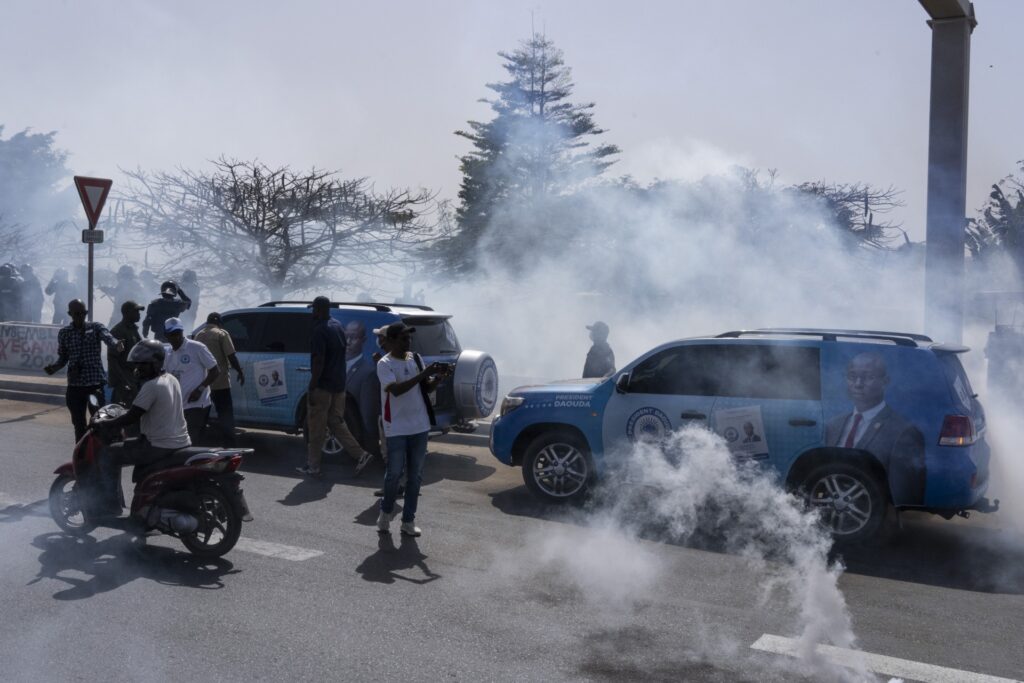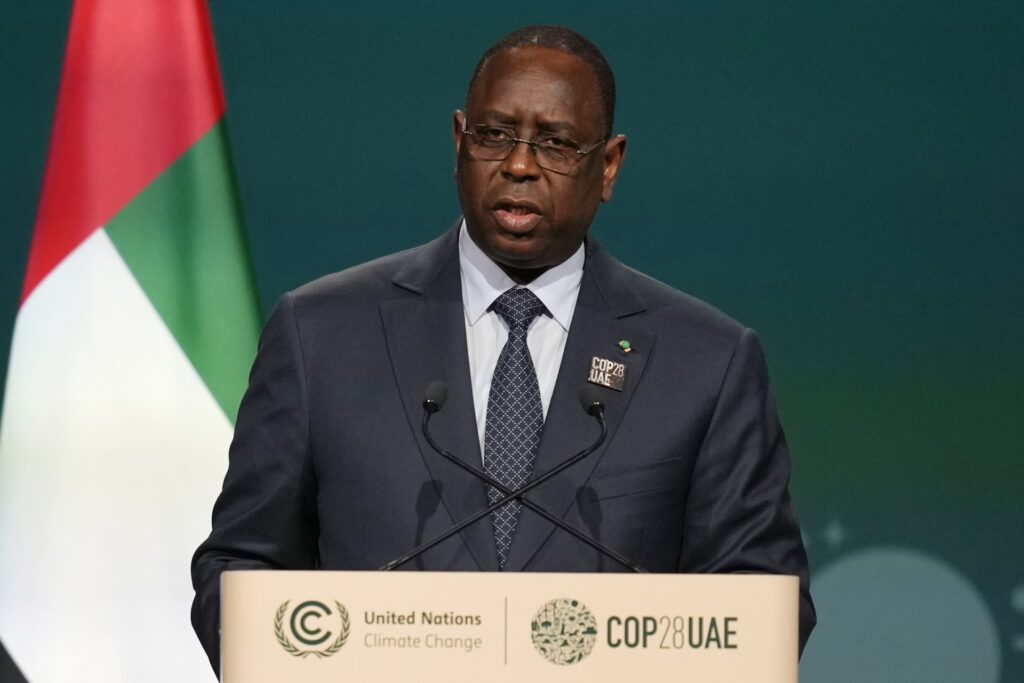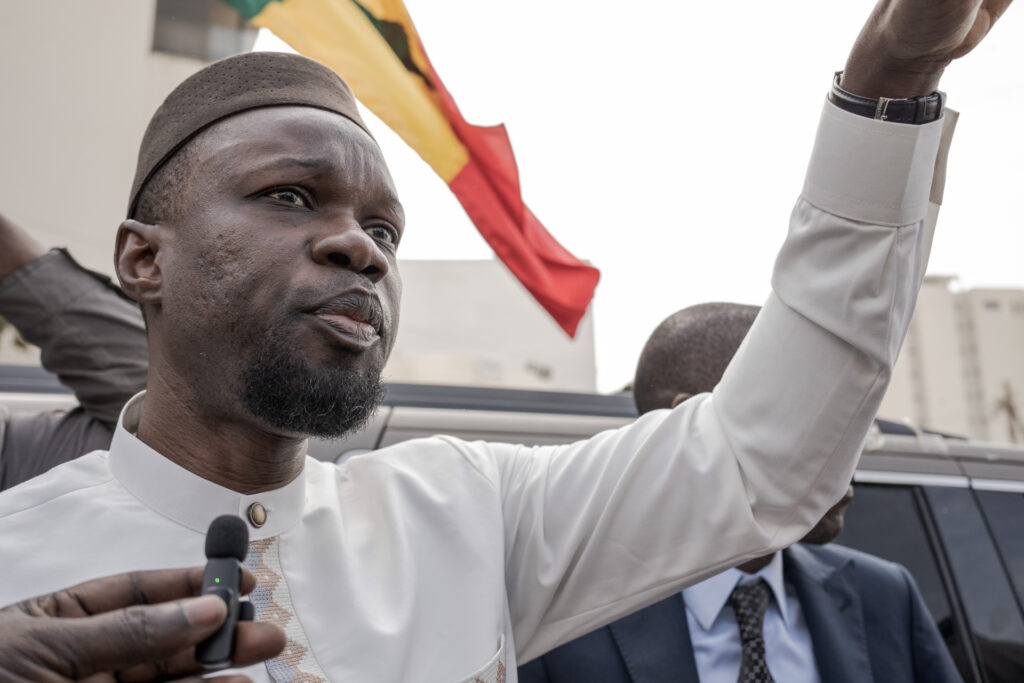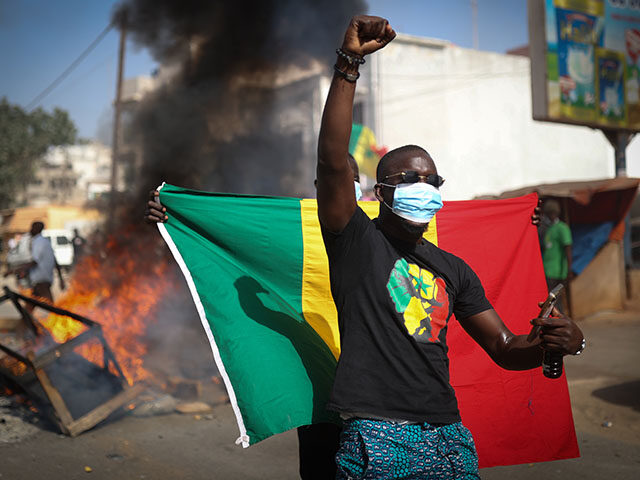The parliament of Senegal voted on Tuesday to delay the February 25 presidential election until December 15, sparking violent protests across the country.
Protesters interpreted the move as a power grab by President Macky Sall, who is constitutionally barred from running for re-election after his term ends on April 1.
Sall is currently serving the second of his constitutionally mandated two terms, so he is not eligible to run for re-election. Sall promised last year that he would not challenge the constitutional term limit, instead naming Prime Minister Amadou Ba as his designated successor.
In a televised address to the nation on Saturday, he took the unprecedented step of delaying the election that would have ended his time in power, ostensibly due to problems with the election process and candidate lists.

Senegal’s opposition leader and presidential candidate Ousmane Sonko’s supporters stage a demonstration and close the roads to traffic burning tires as he went to court to attend the hearing, on March 16, 2023, in Dakar, Senegal. (Annika Hammerschlag/Anadolu Agency via Getty Images)
“These troubled conditions could seriously undermine the credibility of the ballot by sowing the seeds of pre- and post-electoral disputes,” said Sall.
The biggest election scandal concerns Karim Wade, the son of Senegal’s former president Abdoulaye Wade. Karim Wade was banned from running by the Constitutional Court, which ruled he was ineligible because he holds both French and Senegalese citizenship.
Wade denounced the ruling as “scandalous,” especially since he renounced his French citizenship last October. His supporters demanded an investigation of the two judges who ruled against him.
Sall and his supporters might be more worried about another candidate, Bassirou Diomaye Faye, who is running as a placeholder for Ousmane Sonko.
Sonko, a fiery critic of Sall’s administration and a popular leader among Senegal’s youth, was sentenced to prison in June for “morally corrupting” a young woman – essentially a watered-down sexual assault charge. Sonko and his supporters insist this charge, and many others leveled against him, are just politically motivated schemes to keep him out of office.

Senegalese riot police lobs tear gas at supporters of opposition presidential candidate Daouda Ndiaye in Dakar, Senegal, on February 4, 2024. (AP Photo/Stefan Kleinowitz)
Last week, Sonko made his first public address from jail in months to tap Faye as his replacement in the February 25 presidential election. Somewhat inconveniently, Faye is also in jail, having been placed in provisional detention in April on charges of inciting an insurrection. Senegalese courts remain divided on whether either Sonko or Faye can legally run for office. Sonko’s name was not included on the official candidate list published by the Constitutional Council last month, and several other opposition candidates were excluded.
Sonko has long promised his supporters that February’s election would become a decisive confrontation with Sall and the Senegalese political establishment. He appears to have a good chance of winning that confrontation, as Ba’s poll numbers have slipped amid general discontent with the government. Many poll-watchers believe Faye stood a good chance of winning if the election was held on time.
“Our reading is that Sall became convinced that Ba was going to lose to Bassirou Diomaye Faye, the radical running as Sonko’s stand-in, and chose to postpone the election to play for time,” Oxford Economics Africa lead political economist Francois Conradie said after Sall announced the postponement.

Senegal’s President Macky Sall speaks during a plenary session at the COP28 U.N. Climate Summit, on December 1, 2023, in Dubai, United Arab Emirates. (AP Photo/Rafiq Maqbool)
Protests erupted after Sall unilaterally delayed the election, while opposition leaders accused Sall of staging a “constitutional coup” to remain in power and human rights advocates worried the flame of Senegalese democracy was burning low. Senegal has not delayed an election since it gained independence from France in 1960.
Security forces cracked down hard on the demonstrators, leading to allegations of censorship and tyranny. The government shut down mobile Internet access on Monday, citing complaints about hate speech and threats of violence, and at least one private TV station was taken off the air.
Police fired tear gas canisters at protesters chanting “Macky Sall is a dictator!” outside the Parliament building in Dakar while the vote to set a new election date was being held on Monday. Dozens of arrests were made, including former Prime Minister Aminata Toure when she arrived to join the protests.
Inside Parliament, after hours of procedural discussions, a dozen members of the opposition stormed the central podium to prevent formal debate and a vote. They were removed by security forces after about two hours, allowing the vote to proceed. The originally proposed rescheduled date of August 25 was pushed back to December 15 in the final bill.

Senegal’s opposition leader and presidential candidate Ousmane Sonko addresses his supporters as he went to court to attend the hearing, on March 16, 2023, in Dakar, Senegal. (Annika Hammerschlag/Anadolu Agency via Getty Images)
Under the Senegalese election code, at least 80 days must pass after a postponement, so the election could theoretically be held as early as April. A lawmaker from Sall’s party said the rescheduled election was pushed back from August to December to avoid conflicting with Magal de Touba, a religious pilgrimage and national holiday that will be held in August this year.
The bill passed with some help from opposition groups whose candidates were banned from the February 25 race, including the Senegalese Democratic Party (PDS) of Karim Wade. These groups doubtless hoped that a long delay would give them time to restore their candidates to the rolls. On the other hand, three of the candidates who were authorized to run in February have already filed suit to challenge the postponement.
“Senegal has been known as a country with a strong democracy but this is no longer the case. The only thing we want is a fair election,” pleaded a demonstrator outside the legislature.
Other critics worried that Sall might continue postponing the election indefinitely. Numerous foreign governments and international agencies criticized the election delay and demanded a vote as soon as possible, including the United States, the European Union, and France, plus the Economic Community of West African States (ECOWAS) and the African Union (AU).
“Senegal has a strong tradition of democracy and peaceful transitions of power. We acknowledge allegations of irregularities, but we are deeply concerned about the disruption to the Presidential electoral calendar,” the U.S. State Department’s Bureau of African Affairs said on Saturday.
“We urge all participants in Senegal’s electoral process to engage peacefully in the important effort to swiftly set a new date and the conditions for a timely, free and fair election. We also note President Sall’s reiteration of his decision not to run in the election,” the State Department said, throwing a not-so-subtle hint in Sall’s direction that he had better not be plotting a coup.
Senegalese legal experts said on Monday that even if the vote is delayed until December 15, Macky Sall must leave power on April 1, the day his second elected term ends. The president of Parliament would then serve as interim president until a vote could be held.
Sall has not yet given any indication that he plans to step down on April 1; on the contrary, he has said he will remain in charge until the next president has been elected. Ousmane’s allies took to the floor of Parliament wearing sashes in the color of Senegal’s flag on Monday night and called on Sall to resign immediately.
The Archbishop of Dakar, Benjamin Ndiaye, said on Saturday he was “disturbed by what is happening.”
“The Senegalese people must avoid the technique of evasion. If there is a rule, it must be followed. If we respect it, we can move forward,” Ndiaye said.

COMMENTS
Please let us know if you're having issues with commenting.